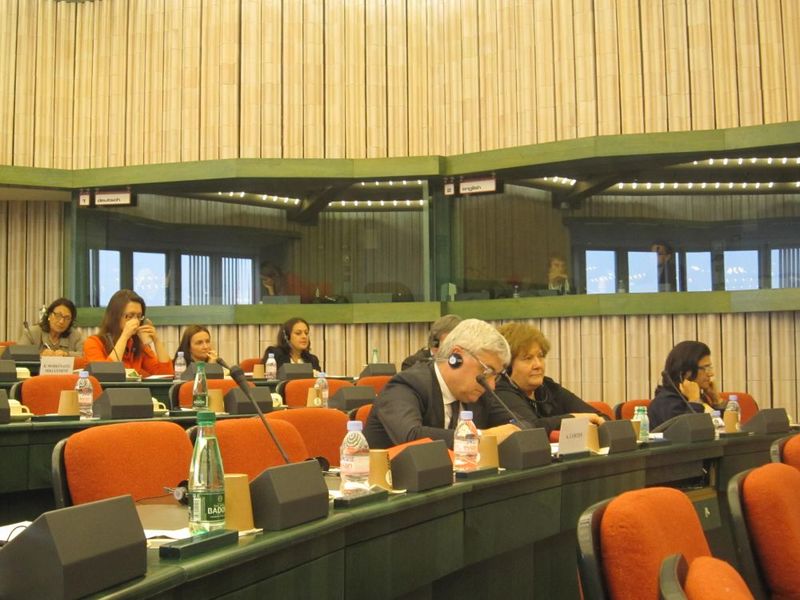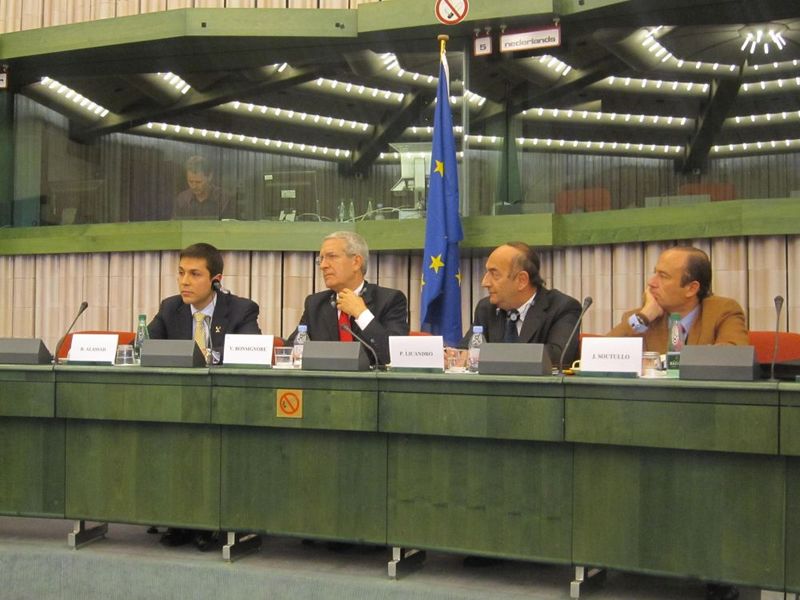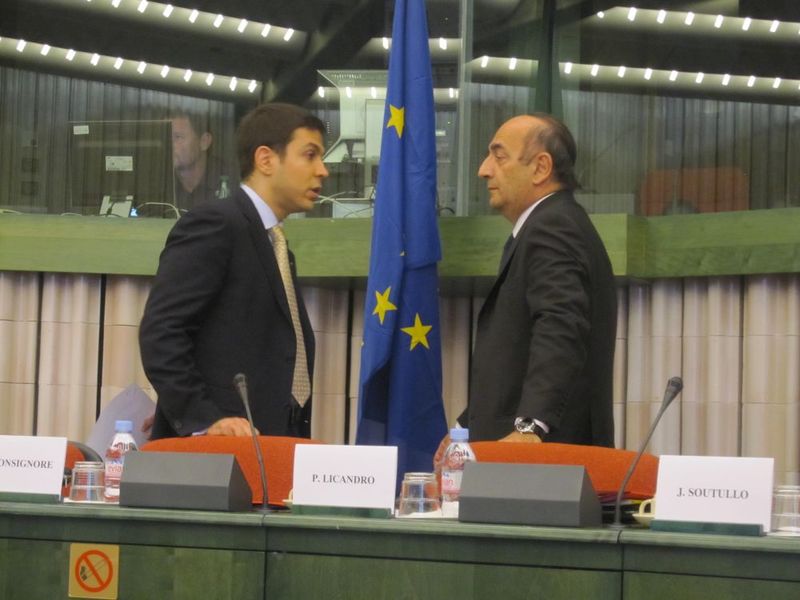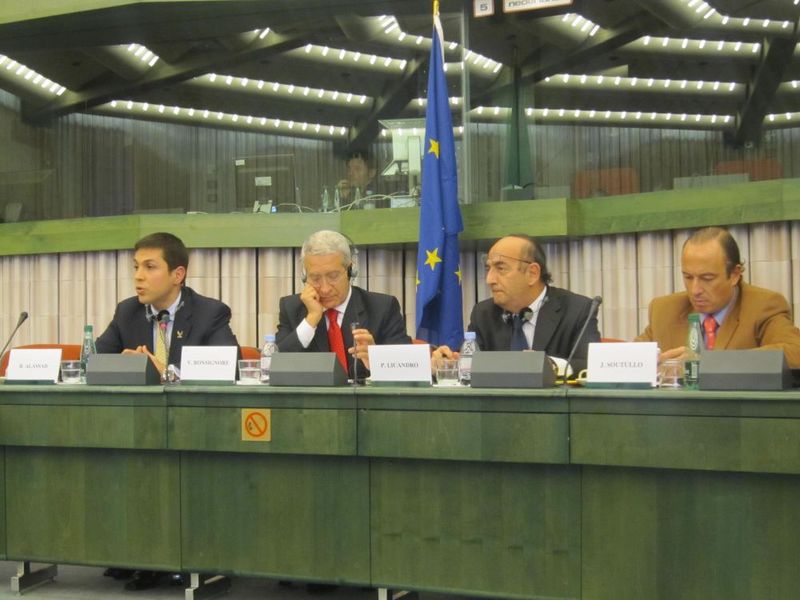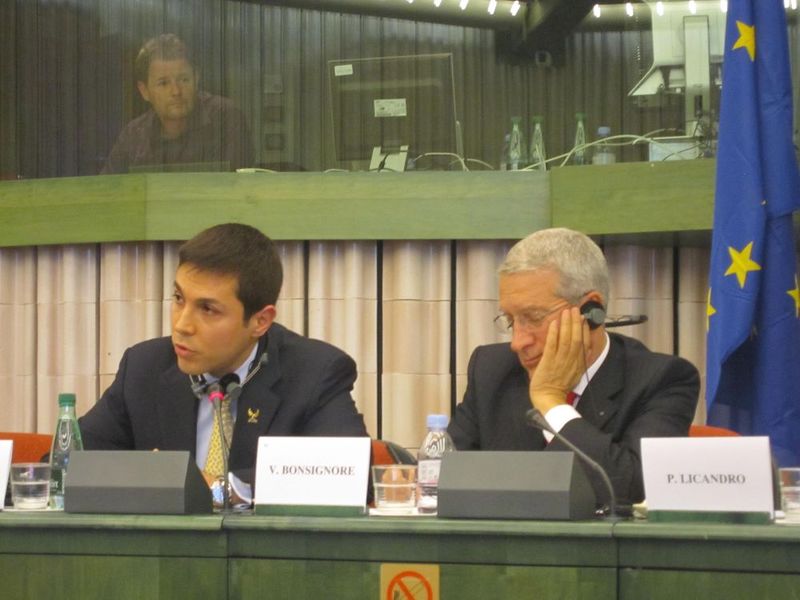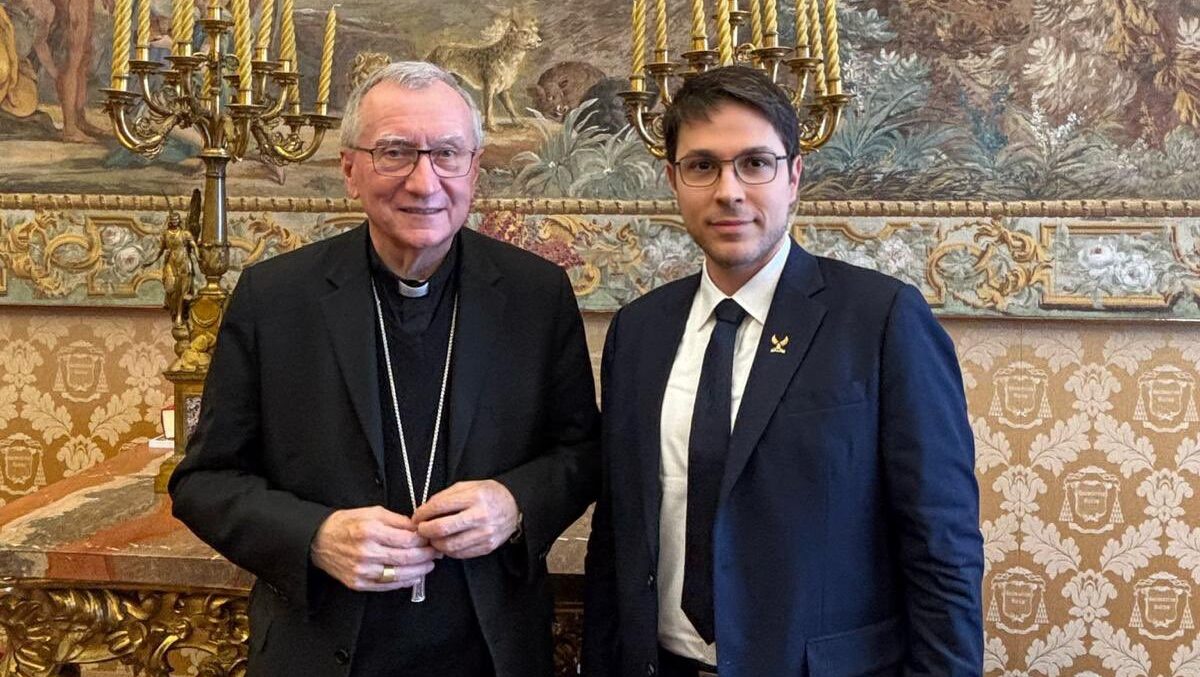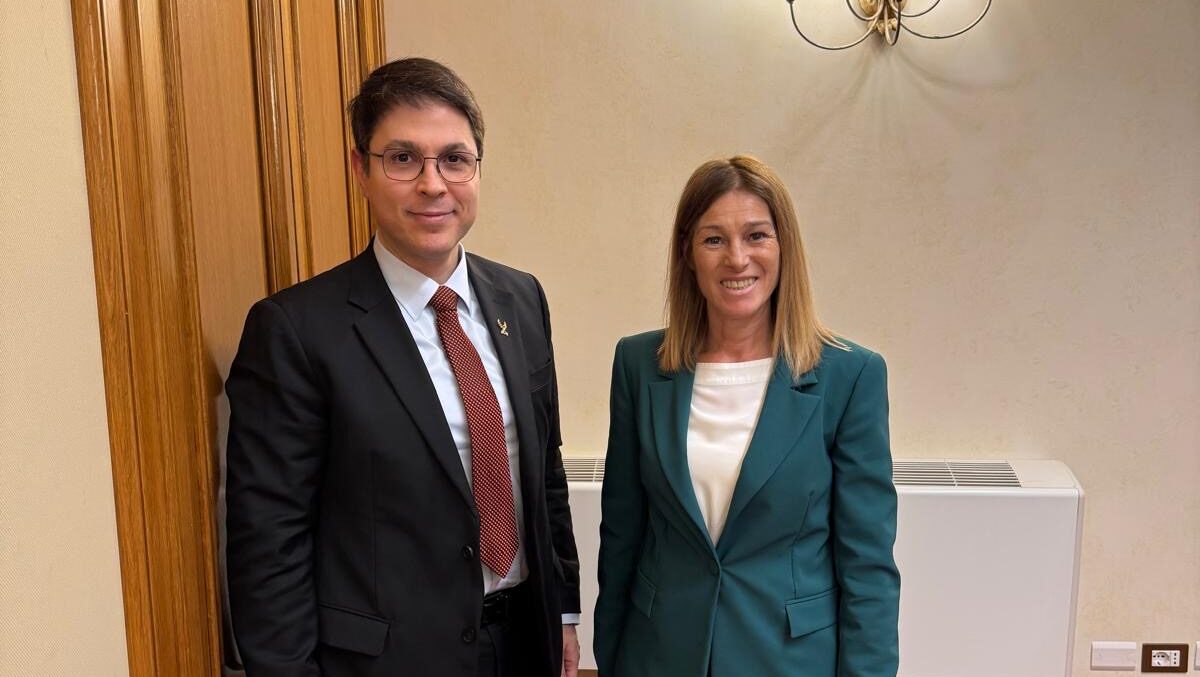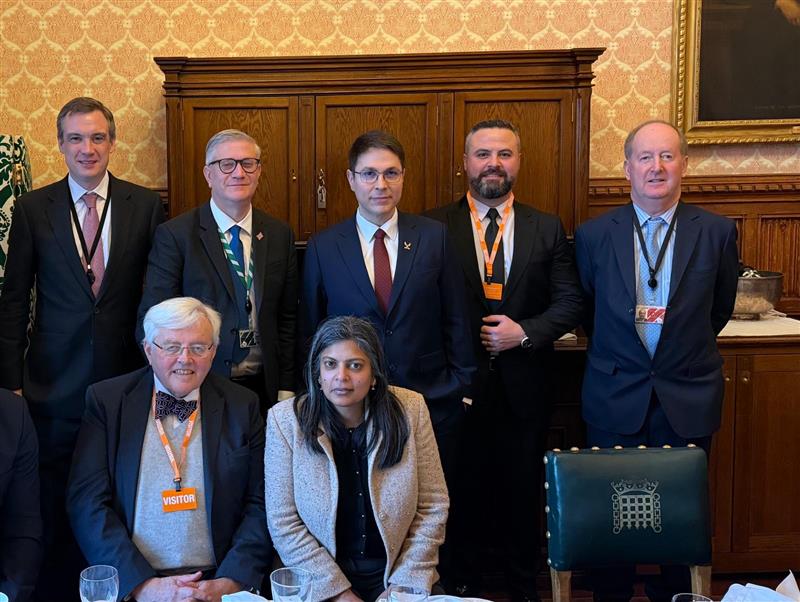Ribal Al-Assad, Director of the ODFS, this week addressed the Group of the European People’s Party (EPP Group) in the European Parliament in Strasbourg, on the crisis in Syria and called for an end to the violence and an united opposition, which works for a peaceful inclusive and democratic transition. The hearing was chaired by Mr. Vito Bonsignore MEP, Vice-Chairman of the EPP Group’s Mediterranean Union, Euromed. The speech was well received and followed by a Q & A session.
The event was attended by MEPs and officials from the EPP Group, which is the largest in the European Parliament with 270 Members and 3 Observer Members from Croatia. It brings together centre and centre-right pro-European political forces from the Member States of the EU.
Ribal Al-Assad made the following speech:
‘Syria: Diplomacy is the only Chance we have’
Good afternoon.
I feel honoured and privileged to be here in Strasbourg …
… with this opportunity to discuss ongoing developments in and around Syria.
The European Parliament provides a benchmark for democracy across the Continent …
… and as the founder of the ‘Organisation for Democracy and Freedom in Syria’ …
… my hope is that one day I will be able to speak in a similarly pluralistic institution inside my own country.
I would also like to thank Elmar Brok and Ioannis Kasoulides …
… for their statement a few months ago …
… in which they stated that the key for President Assad’s departure …
… lies in securing the future of minorities and the formation of an all-inclusive opposition.
I hope that sentiment reassures those of you …
… who saw my picture recently attached to articles in the Lebanese and Arab media …
… reporting on the arrest of a Syrian Army Lieutenant by the Free Syrian Army.
I should confirm at this point that it was not me!
… but was used as part of the opposition’s campaign of misinformation.
I have actually lived in exile from Syria since the age of nine …
… because my ideas differ from those of the regime.
And I have watched with a sense of profound sadness
… as my country has become split internally.
It is now common knowledge that peaceful protests against an abhorrent regime …
… became hijacked by extremists …
… with the ensuing struggle escalating into civil war.
I have always believed that the only remedy to extremism is pluralism.
And I am sure I speak for every one of us …
… in wishing not just for a democratic solution in my country …
… but for peace in the Middle East.
It could not look more unobtainable right now …
… but I still believe that democracy offers the only route to peace.
But that remains a dream at this moment.
And it gives me no pleasure to tell you that my lectures have predicted the current escalation
of violence in Syria and across the region …
… since before the onset of the Arab Spring.
This time last year, I explained how the trickle of civil unrest in Syria …
… was becoming a torrent.
And how that torrent would inevitably push across borders …
… into a full-scale regional war.
And it only takes a cursory look at the news headlines in the past couple of weeks …
… to see that torrent becoming a tsunami.
The Turkish military has returned fire after a shell launched from Syria struck the border village of Akcakale …
… Syrian and Armenian planes have been forced to land in Turkey, leading to bans effecting Syrian and Turkish air space…
… and sectarian-fuelled violence is spreading like wildfire across Lebanon.
No wonder that US Defence Secretary Leon Panetta has finally articulated his fears that a regional war is a real possibility.
Or that Dmitry Medvedev has warned that military action against sovereign states could lead to a regional nuclear war.
Or that Iraqi Prime Minister , Nuri al-Maliki has stressed that military intervention in Syria will lead to war and that foreign involvement will lead to regional war.
Or that President Ahmadinejad has warned that hostilities in Syria could engulf the region …
… particularly as his elite Revolutionary Guard has a presence in Syria …
… and that Iran and Hezbollah have said openly that they, as part of the ‘Axis of Resistance’,
will not allow the Syrian regime to fall.
Or that the Turkish, Saudi, Jordanian and Israeli armies are all on a state of high alert.
Meanwhile, inside my country, the well-documented barbarity of the incumbent regime …
… competes with the increasingly extremist opposition …
… to rack-up more human rights violations.
The death toll now stands at 33,000 since hostilities began.
And it has probably risen since I began speaking.
Something needs to be done.
But I believe that Syria’s future is currently being blighted by too many external parties …
… with too many vested interests …
… doing things that are not in the best interests of the Syrian people.
I would like to use this opportunity to explain why.
Here in the West …
… we are still regularly treated to a relatively straightforward analysis of the Syrian situation.
I’m sure it will be familiar to you …
… but let’s call it the ‘Game Above the Table’.
And above the table, everything is as it seems.
A vicious dictator has persecuted his people …
… a peaceful uprising has been mercilessly put down …
… the political opposition has been forced to work in exile …
… international plays for peace have been conducted at various ‘Friends of Syria’ conferences …
… endorsed by numerous calls for a ceasefire …
… and ongoing UN intervention.
This is a game played out between good and evil:
The US, NATO, UN and opposition forces …
… fighting the incumbent regime …
… and frustrated by the geo-political posturing and Security Council veto of Russia and China.
Sadly, this is just not an accurate representation of the forces involved.
This is no Sierra Leone.
And there is no easy solution.
In practise, there is a more complex and sinister game being played-out under the table.
And a man who recognises it more than most is Kofi Annan …
… who, having stepped down in his official capacity …
… is now being candid about the realities.
He has recently criticised both the reporting and the wider political understanding of the conflict in Syria.
He has even praised Russia and China for blocking Western efforts to internationalise the crisis.
But why?
The answer stems from three interwoven tiers of conflict honing in on Syria.
The first is global.
The US, China and Russia have, since before the onset of the Arab Spring …
… been posturing over issues ranging from missile defence shields to the US’ perceived policy of encirclement in the South China Sea.
The Cold War is rearing its head once again.
And as attention has focused on Syria and the Eastern Mediterranean …
… Dmitry Medvedev and Vladimir Putin have warned about the impact of military intervention
… whilst Mitt Romney has declared that Russia “is without question, our No. 1 geopolitical foe.”
Under the table, President Obama has signed a covert order authorising support for Syrian rebels …
… permitting the CIA and other US agencies to provide assistance to help oust the Syrian regime.
Russia has provided the regime with three million gas masks and surface to sea and air
missiles …
… not least because it shares with China, a serious concern about the consequences of
Islamic fundamentalism at home …
… in addition to their strategic interests in the region …
… and ongoing posturing against the West.
Tier two is regional …
… where I have already mentioned the spread of violence out of Syria …
… but now need to highlight the ever-heightening tensions fuelled by a widening Sectarian divide .
A Turkish-led Sunni axis encompassing Qatar and Saudi Arabia …
… opposes an Iranian-led Shia axis forming through Baghdad, Beirut and Damascus.
Lines have been drawn …
… and unlikely alliances formed.
Turkey has been most obviously effected.
Her combination of democracy and Islam was recently hailed as a benign model for the
region …typified in the commercial and political partnership with Syria.
And three years ago, Friday’s apparently conciliatory words from Ahmet Davutoglu, Turkey’s
foreign minister would have seemed in context:
He explained that “the best way we can see now is direct humanitarian intervention.”
He also observed that the future of the regime in Syria is:
“Ultimately a matter for the Syrian people. It is not our business, it is for them to decide.”
But this was spoken very much ‘Above the Table’.
Were Turkey a truly democratic and supportive neighbour …
… she would have played the diplomat and helped Syria’s seamless transition to democracy.
For a more realistic view of Turkey’s rationale, we should remember that President Erdogan
endorsed the Muslim Brotherhood-dominated SNC opposition in Syria …
… embarked on an increasingly bitter sectarian slanging match with Iraq …
… questioned whether the Syrian President is a ‘real’ Muslim …
… and recently compared the current situation in Syria with the battle of Karbala.
This rhetoric is increasingly hard to separate from the Turkish government’s decision last
month to give the green light for military force against Syria if necessary …
… particularly when the non-Islamic opposition in Turkey remains opposed to intervention.
In this context, it is clear what an impact the outcome of the Syrian conflict will have on so many vested interests across the region.
For Turkey there is also the potential impact of independent Kurdish regions in Iraq and Syria on her own Kurds.
For Tehran and Baghdad there is the need for a strategic ally on the Mediterranean coast.
For Qatar there is Iran-Iraq-Syria gas pipeline deal to overturn …
… and the opportunity to build an alternative line to the coast.
For many prominent players in Saudi Arabia …
… the motivation is clearly more sectarian than strategic:
Islamic clerics on Saudi-owned WISAL and SAFA satellite TV stations exhort their people to
join the war against the ‘Shia and Alawite Infidel’.
Sheikh Saleh al-Luhaidan, the former Chief Justice of the Supreme Judicial Council in Saudi
Arabia, calls for jihad against Alawites, even if one third of the Syrian people die in the
process.
BBC News has uncovered evidence that weapons intended for the Saudi military have been
diverted to Syrian rebels in Aleppo …
… and the former French intelligence chief has also pointed to Qatari and Saudi funding of
extremist Islamist groups in France.
And the New York Times reported last week that US intelligence officials have acknowledged that:
“Most of the arms shipped at the behest of Saudi Arabia and Qatar to supply Syrian rebel
groups fighting the government of Bashar al-Assad are going to hard-line Islamic jihadists.”
Which brings me to the third tier …
… inside Syria itself.
The atrocities committed by the regime are relatively well documented …
… the actions of the opposition less so.
And I am certain that this stems less from an inherent media bias …
… than from a lack of understanding about who the opposition in Syria really are …
… and what they really want.
For a start, we must dispel any notion that this is the same opposition that early in 2011 was
marching for peace.
Nor is it representative of our people …
… whose mosaic of ethnicity is wide and deep …
… with 45% classified as ‘minorities’ – more than any other country in the region.
That initial uprising included people from across the entire spectrum of Syrian society …
… whose only motivation was a better future for Syria.
But there were already sinister forces at work.
After the cessation of the war in Gaza …
… and three years before the Arab Spring …
… Turkey had already established close links with the Muslim Brotherhood in Syria.
Once the Syrian Spring was underway …
… it then formed the Syrian National Congress …
… and, along with Qatar, promoted it as the ‘official’ opposition to the regime.
It did so knowing that the Brotherhood made-up eighty percent of its membership.
It willingly allowed armed opposition and foreign fighters to cross its borders into Syria.
And it continues to host the Free Syrian Army’s central command.
Meanwhile, Saudi Arabia started to actively promote other Islamist groups …
… including the Salafis and many Jihadis.
All other opposition groups were then excluded from the table at the various Friends of Syria
Conferences …
… isolating a number of moderate groups including The Kurdish National Council and my own.
Michel Kilo, a member of the Syria-based National Committee for Democratic Change has
openly criticized the SNC for this lack of inclusivity.
He recently suggested that:
“Its policies have … complemented the regime in bringing Syria to … the brink of mass
destruction and near unspeakable tragedy.”
In this context, we should remeber that the Annan plan was initially welcomed by the
International Community …
… but then undermined by the ‘Friends of Syria’ meeting in Istanbul a week later …
… where the good work above the table was undermined by Qatar and Saudi pledging money
and arms to the opposition.
Meanwhile, Kamal al-Labwani, a physician and prominent opposition leader for many years
… resigned from the Council …
… describing it as “an opposition under the cloak of fanatics hiding behind a veneer of stupid
liberals”.
He explained that “The Brotherhood are its dominant force. There is the Hama faction, the
Damascus faction and the Aleppo faction of the Brotherhood. The Hama faction is backed
and funded by Qatar and Turkey.”
It is no surprise that the SNC watched-on as the cause was hijacked by more sinister groups
… with growing Salafi dominance.
As James Clapper, Head of US Intelligence stated last year, the Syrian opposition is
fragmented and infiltrated by Jihadists including Al Qaeda.
This remains the case, and the groups are often at odds with each other.
It was clearly illustrated when Abdel Salam Harba …
… the military opposition chief in Western Syria …
… issued an ultimatum for the Christian population to flee the city of Qusayr.
And so it is not surprising Christian and Armenian fighters have been fighting for over two months in Aleppo …
… to prevent Free Syrian Army rebels from entering Christian areas of the City.
Many refugees have quoted rebel fighters as shouting:
“Alawites to the graves and the Christians to Beirut”.
And so it would be a mistake even to assume that every opposition party is motivated by a desire to benefit the Syrian people.
Their goals are diverse.
Leaders of Islamist fighters …
… including the Farouq Brigade …
… have now formed the “Front to Liberate Syria”.
Its leader has explained how they seek a state with Islamic reference.
This was endorsed by an article in the Jewish Chronicle filed last week from Al Midan, a
suburb in southern Damascus …
… where an opposition fighter shared his ideas for a post-Assad Syria:
“We have to a build a society of respect and brotherhood in accordance with the Prophet’s commandments. We will treat non-Muslims kindly, but we have a big fight against the Jews ahead of us. We will take that up, God willing.”
Jacques Beres of Medecins Sans Frontieres treated wounded rebels in Aleppo.
He quoted them as being intent on waging holy war and establishing an Islamist state.
“It’s really something strange to see.
They are directly saying that they aren’t interested in Bashar al-Assad’s fall, but are thinking
about how to take power afterwards and set up an Islamic state with Sharia Law to become
part of the world Emirate”.
He also explained that the French citizens in his care were inspired by Mohammed Merah …
… a terrorist who killed a rabbi and three Jewish children in Toulouse in March.
Which made it less surprising two weeks ago that a French terror cell was found to be
planning a trip to Syria.
Which brings me to the most worrying aspect of this crisis from my perspective:
Namely that Syria is now importing terror and terrorists from across the world …
… all with their own objectives far removed from the future of my country.
Alarabiya.net quoted a purse seller from Aleppo:
“I sell to women in Libya while they send their unemployed men to fight our soldiers.”
Others have travelled from Tunisia, Yemen and most critically, Iraq.
Kofi Annan pointed to the arrival of groups armed by Arab States.
He understandably did not mention names, but there is widespread evidence of extremists arriving in Syria carrying Saudi weapons.
Some have arrived from much closer to home.
Only last week, a group of Islamists were arrested here in the UK on their way to Syria.
John Cantlie and Jeroen Oerlemans, the released British and Dutch hostages …
… described their kidnappers as “foreign jihadists” …
… from Chechnya, Pakistan, Bangladesh and Britain …
… and that some had “Birmingham accents” and at least one other was from South London.
And as Jihadists flood into the country …
… trouble passes them in the opposite direction.
On Friday, Brigadier General Wissam al-Hassan, an intelligence chief opposed to the Syrian
leadership, was assassinated in Lebanon.
Lebanon has been increasingly combustible ever since …
… with sectarian clashes in the Northern City of Tripoli …
… and increasing aggression between fighters pro and anti the Syrian regime elsewhere.
Yesterday, the Jordanian military announced that a soldier had been killed in a shootout with militants.
Information Minister Sameeh Maaytah said the country had witnessed its first military fatality as a result of Syria’s civil war.
And, as I have already mentioned …
… Turkey is also reeling from the Syrian regime’s retreat from the Hasakah region in the
North East …
… which has effectively given freedom for self-rule to its Kurdish majority – led by the Syrian
Kurds, the PYD …
… a move that could be seen as a direct response to Turkey’s ongoing support for the SNC
and the armed opposition.
This has raised the possibility of a ‘Kurdish Spring’ inside Turkey where the Turkish
government are alarmed by the armed alliance of the PKK – the Turkish Kurds – with the
PYD.
Meanwhile, the United Nations’ Refugee Agency estimates that 710,000 Syrian refugees will
require assistance by the end of the year …
… disrupting the delicate balance of interests in Turkey, Lebanon and Jordan.
The net result
I could go on.
Every day my email inbox is inundated with stories of atrocities …
… of arms and fighters entering Syria ..
… of escalating international tension …
… of threats and counter-threats …
… of kidnappings …
… of fires that keep burning as my country continues to disintegrate.
And as long as the game under the table continues …
… with the major powers talking peace whilst playing war …
… the current deadlock will be impossible to break.
Because no opposition can bring down a regime supported by Iran, Russia and China.
Nor can the regime crush an opposition armed and funded by Saudi Arabia and Qatar …
… and supported by Turkey and the West.
The Kofi Annan plan was doomed because the UN has to play above the table whilst being
undermined beneath it.
Lakhdar Brahimi, Annan’s replacement …
… was not exaggerating when he described his task as “the impossible job”.
And as British Labour politician and campaigner Peter Hain wrote on Sunday:
“The current policy is failing on a monumental scale. Unless there is a radical change, all the
hand-wringing and condemnation is either empty or hypocritical – or both.”
We cannot only apportion blame by pointing East.
Parallels elsewhere in the region
As a frustrated, angry observer, exiled from my country …
… I am no apologist for the regime.
But an opposition is not worth supporting simply because of the regime it opposes.
And that’s a view shared by anyone following events in Libya right now.
It wasn’t long ago that Britain, along with France, Qatar and the United States …
… backed the opposition in Libya to overthrow a tyrannical dictatorship …
… and effectively gave our blessing to what followed:
Anarchy.
The assassination of the US Ambassador was just the highest profile tragedy to ensue.
Last week, demonstrators broke into the grounds of Libya’s parliament …
… forcing their way past perimeter security guards …
… opening fire on police …
… and smashed glass on the main doors to the national congress hall.
On Sunday evening the parliament was ringed by troops and militiamen.
A placard outside read: “We will die before we surrender Bani Walid.”
With swathes of the country now ruled by armed militia …
… this reference was to the fighters of the City of Bani Walid, still loyal to the old regime …
… who are under their fourth day of bombardment from soldiers acting under the orders of
Libya’s new government.
This is serious.
The Bani Walid people are part of the Orfallah tribe …
… which, with 1.5 million members, is Libya’s largest.
Unbelievable as it may sound …
… a Libyan friend of mine called recently …
… to tell me that he had been offered twenty surface to air missiles.
Unbelievable – but true.
Meanwhile, the ripple effect from the Libyan intervention has made its way across Africa …
… with weapons from the conflict now being used in Somalia …
… and with the civil war in Mali inflamed by the arms from Libya finding their way into the
hands of Islamist rebels.
In Syria’s case, the current opposition …
… partly fuelled as it is by Jihadists and sectarian prejudice …
… draws equally close parallels with 1980s Afghanistan.
David Ignatius wrote an excellent piece in the Washington Post on that subject.
Western involvement in Syria is implicitly supporting jihadist opposition.
Russia is an adversary.
In the 1980’s the Saudis financed and supported the Mujahedeen in their fight against
the ‘godless’ Soviets.
That ‘great victory’ in the depths of the cold war led to rampant fundamentalism that is still
menacing the Middle East and much of the world.
And we can also add Iraq to the mix …
… where latest reports suggest that Al Qaeda is on the rise again.
In the current climate, it is difficult to predict any alternative outcome from the Syrian
conflict … although its impact would be greatly exaggerated given Syria’s geo-strategic and political importance.
And so we are caught in a Catch 22 of monstrous proportions.
The regime must be replaced.
But if it were to fall tomorrow …
… I believe that the conflict would simply be superseded by something equally violent …
… leading to a fragmentation and potential disintegration of the state …
… to be replaced by a political vacuum, leaving Syria at the whim of fundamentalists,
including Al Qaeda, Salafi and Wahabi elements …
… which can hardly be in its best interests.
There will be no happy ending through intervention …
… but there may be through diplomacy.
Koffi Anan has said exactly that.
Ban Ki Moon observed that “Militarisation only aggravates the situation. I am calling on all
concerned to abandon the use of violence, and move toward a political solution. That is the only way out of the crisis.”
Vladimir Putin spoke sense in an interview with RT when explaining that:
“We realize that this country needs a change, but this doesn’t mean that change should come
with bloodshed. We would like to stay away from Islamic sectarian conflict, or interfere in a
showdown involving the Sunnis, the Shia.”
When the Current UN Chief, a previous UN General Secretary, and the Russian President all speak out against intervention
… then the world needs to listen.
I believe we are at a significant moment …
… not just in the history of Syria …
… but of the entire Middle East.
We can either collectively push for peace …
… or allow this situation to explode into all-out war.
And if we choose the latter …
… then the 33,000 who have fallen to the conflict so far …
… will be a small footnote in terms of what will follow.
Which means that every person interested in democracy, peace and human rights …
… must demand that the world ceases to engage in the game under the table.
Lakhdar Brahimi has called for a ceasefire on 26 October for the four-day Eid al-Adha holiday.
We should do whatever we can to encourage it.
We must also cease to hold-hands with Jihadists …
… simply because we share a common enemy.
We must cease to turn a blind eye to human rights abuses in parts of the Middle East …
… simply because we benefit from vastly profitable trade and defence deals.
We must be rational, calm and democratic even in the face of longstanding sectarian hostility.
We must discourage the implicit and explicit arming of the opposition.
We must set an example by engaging with Russia and China to promote a peaceful situation.
We must condemn the extremist clerics advocating the murder of minorities, including the
Grand Mufti of Saudi Arabia who called for “all churches across the region to be destroyed”.
We must do all we can to ensure that Syrian institutions stay intact.
We must pressure the regime, the opposition and their outside backers into supporting diplomacy.
Finally, and most urgently, we must entice the Syrian opposition to finally come onto one platform and speak with one voice.
There are still a huge majority of Syrians who want peace.
There is still a civil, national, and democratic movement …
… it just needs encouragement, inclusivity and leadership.
This was a point made clearly by Michel Kilo of the Syrian Democratic Platform …
… who wrote last week of Al Jazeera and Qatar focusing on the extremist elements of the opposition …
… highlighting inflammatory images like the black flag of Salafi fundamentalists …
… whilst hiding from view hundreds of national flags close to or surrounding it.
I still believe that there is an opportunity for a negotiated outcome …
… a view endorsed in an excellent paper published ten days ago by the International Crisis Group.
As Peter Hain observed on Sunday …
… the best road map for peace remains within the guidelines for a political transition
approved by the five permanent members of the UN security council in June.
But only if the West, Saudi Arabia, Qatar and their allies drop their current stance and help to
implement it
A Yemen-style process may work …
… where a hated president did not resign but nor did he stand for re-election.
A coalition government of national unity could then prepare for Syrian elections, due in 2014.
If the various elements of the opposition to the regime could work collectively …
… representing all groups within the Syrian population …
… and encouraged by the world’s superpowers …
… to say no to extremism …
… then democracy still has a chance of defeating sectarianism.
It’s only a small chance …
… but it is the only chance we have.
I would be delighted to answer your questions.
Nous vous remercions.
